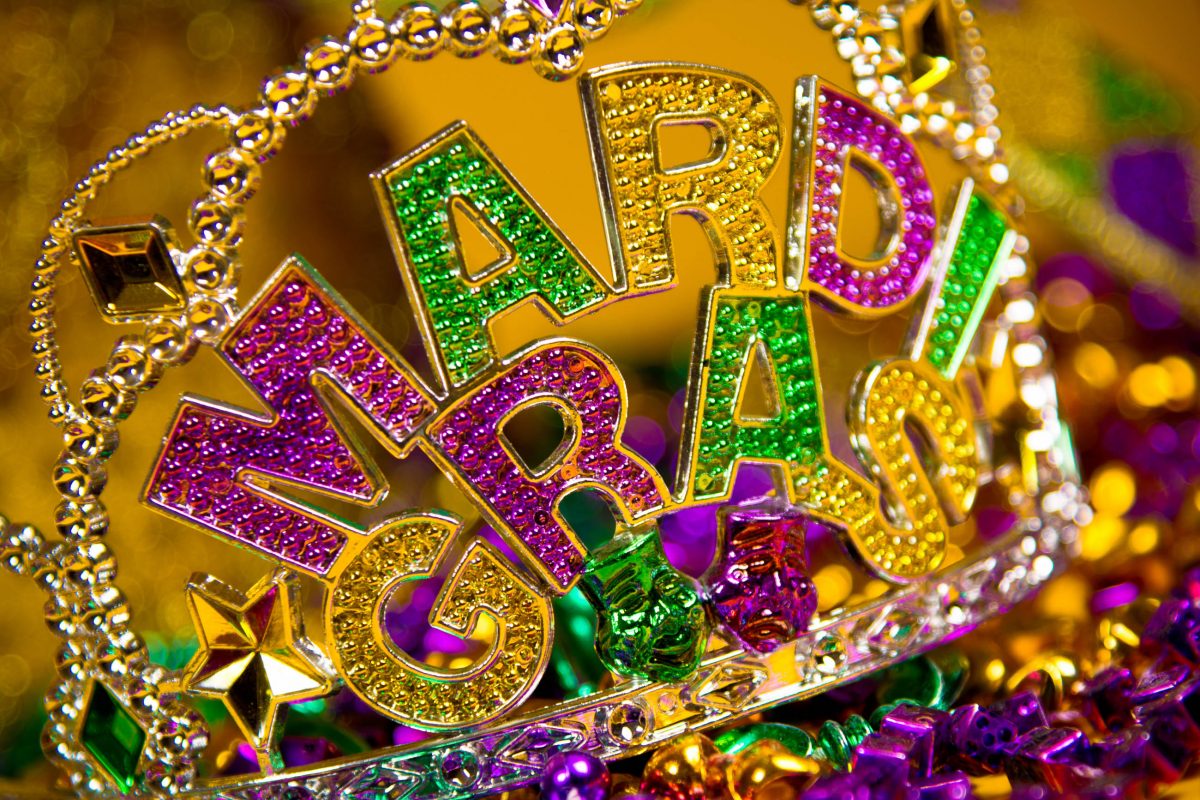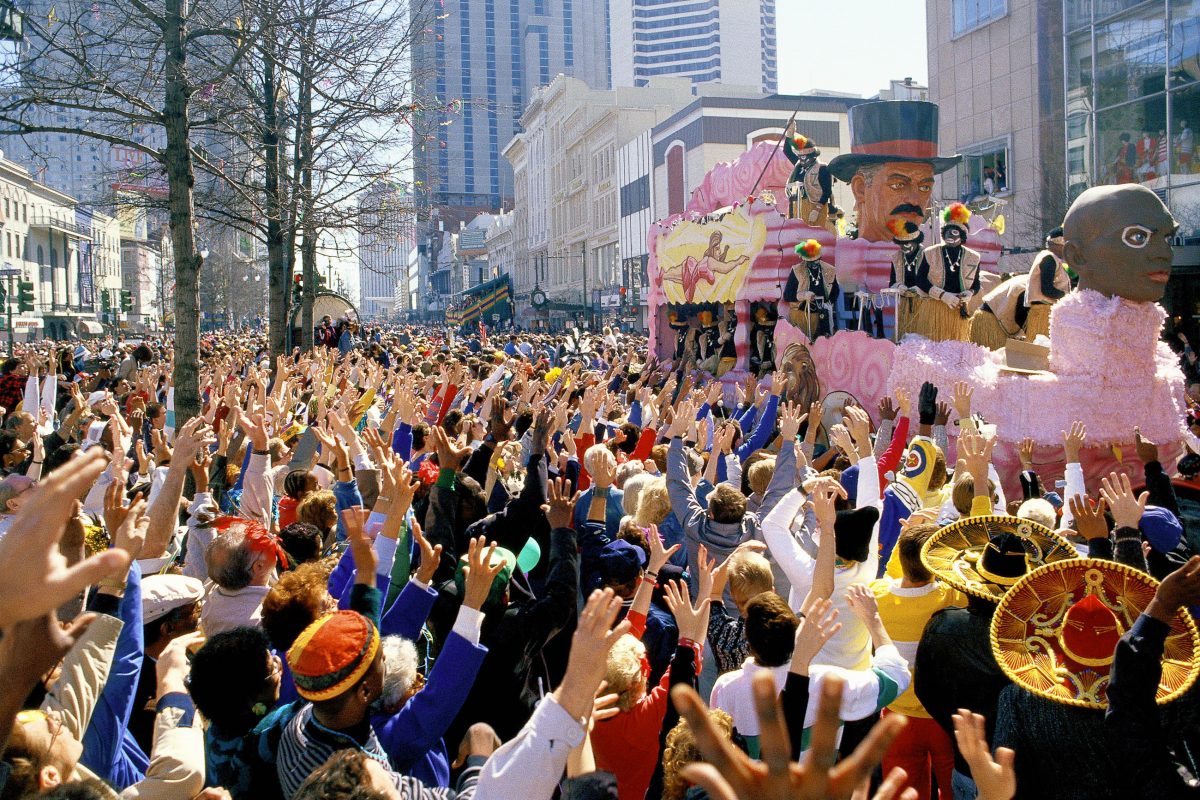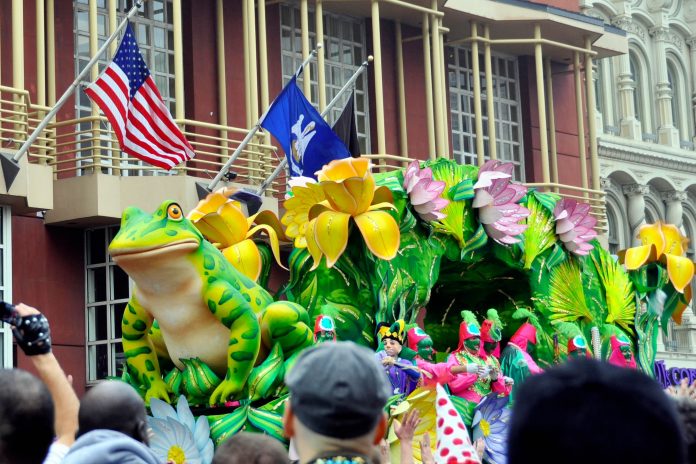Der Faschingsdienstag, in den USA besser bekannt als „Mardi Gras“, wurde in New Orleans 1875 zum Feiertag erklärt und steht für farbenprächtige Umzüge und ausgelassenes Feiern in der ganzen Stadt.
Der Karneval in New Orleans, Louisiana, ist besser bekannt unter dem französischen Schlagwort „Mardi Gras“ („Fetter Dienstag“). Ein untrüglicher Hinweis auf das tagelange Schlemmen vor der Fastenzeit. Aus den gesamten Vereinigten Staaten und mittlerweile auch aus Europa strömen in der Faschingszeit Feierwütige, die New Orleans zu einer einzigen Partymeile machen.
Inhaltsverzeichnis
BILDER: Karneval (Mardi Gras) in New Orleans
Fotogalerie: Karneval in New Orleans (Mardi Gras)
New Orleans hat die Tradition von Mardi Gras den Franzosen zu verdanken, die in die USA eingewandert sind. Warum sich gerade New Orleans zur Karnevalshochburg entwickelt hatte, ist nicht mehr hundertprozentig nachvollziehbar.
Fest steht, dass der Karneval von New Orleans mittlerweile weltweit bekannt ist und jedes Jahr tausende Besucher in die Stadt lockt, die die Einwohnerzahl in der Faschingszeit verdoppeln. Zu den ausgelassensten Mardi-Gras-Destinationen in New Orleans, wo auch die meisten Touristen anzutreffen sind, zählen die Bourbon Street und das French Quarter.
Tipp: Wer beim Mardi Gras dabei sein möchte, sollte seine Unterkunft bereits Monate zuvor buchen, da die Zimmer immer teurer werden, je näher der Karneval rückt. Für einen guten Platz, an dem man die Paraden vorbei ziehen sieht, sollte man etwa vier Stunden vor Beginn eintreffen.
Mardi Gras in Grün, Gold und Violett

Die erste Parade zu Mardi Gras wurde im Jahr 1857 abgehalten und 18 Jahre darauf der Faschingsdienstag zum Feiertag erklärt wurde. Für die Organisation sind nach wie vor die so genannten „krewes“ zuständig. Bis heute hüllt sich jedes Jahr die gesamte Stadt in die offiziellen Karnevals-Farben Grün (Hoffnung), Gold (Macht) und Violett (Gerechtigkeit).
Jung und Alt begleiten die von den „krewes“ aufwändig geschmückten Paradewagen mit Pauken und Trompeten durch die Straßen. Trotz Kriegen und Naturkatastrophen, wie dem Hurrikan Katrina 2005, bestanden die Bewohner von New Orleans auf ihre Party-Tradition.
Ablauf von Mardi Gras in New Orleans

Mardi Gras beginnt mit dem traditionellen Maskenball, der von den ältesten „krewes“ organisiert wird. Schon drei Wochenenden vor Faschingssonntag zieht die „Krewe du Vieux Parade“ durch die Stadt, die von Musikern und Bands begleitet wird.
Zwei Wochen vor Mardi Gras findet etwa jeden Tag ein Umzug statt, die zum Faschingsdienstag hin immer prachtvoller und ausgelassener werden, bis am Mardi Gras der Höhepunkt der Feierlichkeiten erreicht ist.
Die ausgelassenen Paraden sind dabei nicht so gesittet wie beim Karneval in Köln oder in Venedig, sondern erinnern eher an die brasilianischen Karnevalsfeiern in Rio de Janeiro oder Salvador da Bahia.
Ein Maskenball im Hotel Marriott von New Orleans beendet das bunte Treiben offiziell, inoffiziell wird natürlich die Nacht bis zum Aschermittwoch durchgefeiert.
Tipp: Am Mardi Gras haben alle Geschäfte in New Orleans geschlossen und die Restaurants sind meist hoffnungslos überfüllt. Daher entweder einen Tisch im Vorfeld reservieren, oder selbst Verpflegung mitbringen.
„International Show your Boobies Day“

Wer mit zu viel Freizügigkeit nicht umgehen kann, sollte sich von den Paraden fernhalten, denn Mardi Gras heißt in Insiderkreisen nicht umsonst „International Show your Boobies Day“. Für die farbigen Ketten aus Kunstperlen in verschiedensten Größen, die von den Paradewägen aus in die Menge geworfen werden, wird schon das eine oder andere T-Shirt gelüftet oder ganz ausgezogen.
Und viele kostümierte Damen, die die Perlenketten verteilen haben sich gleich gar nicht die Mühe gemacht, ein Oberteil mitzunehmen und ihren Oberkörper lediglich kunstvoll bemalt – oder nicht einmal das.
Neben den bunten Perlenketten werden auch Süßigkeiten und Kuscheltiere von den Paradewagen in die Menge geworfen und es laufen Wettbewerbe, wer die meisten Goodies für sich beanspruchen kann. Damen, keine Sorge, wer seine Brüste nicht zeigen möchte, kann die Herren auf den Wägen auch mit einem lauten „Throw me something, Mister!“ auf sich aufmerksam machen.
Weiterführende Links:





